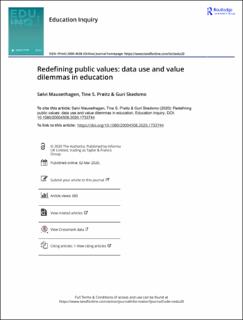Redefining public values: Data use and value dilemmas in education
Peer reviewed, Journal article
Published version
Permanent lenke
https://hdl.handle.net/11250/3035127Utgivelsesdato
2020Metadata
Vis full innførselSamlinger
Originalversjon
10.1080/20004508.2020.1733744Sammendrag
In this article, we explore how values in education are negotiated and partly redefined by teachers, school leaders and local administrators with data use and accountability. Two dilemmas are prominent for the teachers: 1) Testing and data use are perceived as important to meet the needs of the students and to create transparency and initiating innovation in schools, yet they lead to performance pressure on the students and narrow the societal mandate in education, and 2) Although it is important to identify students at the lowest proficiency levels, the established accountability chains acknowledge the progress of these students and the teachers’ efforts only to a limited extent. However, values such as meeting the needs of individual students, transparency and innovation/renewal are partly redefined and narrowed on other institutional levels. The dilemmas represent real normative conflicts in public services that are ultimately unsolvable yet not necessarily at odds with professional values.

